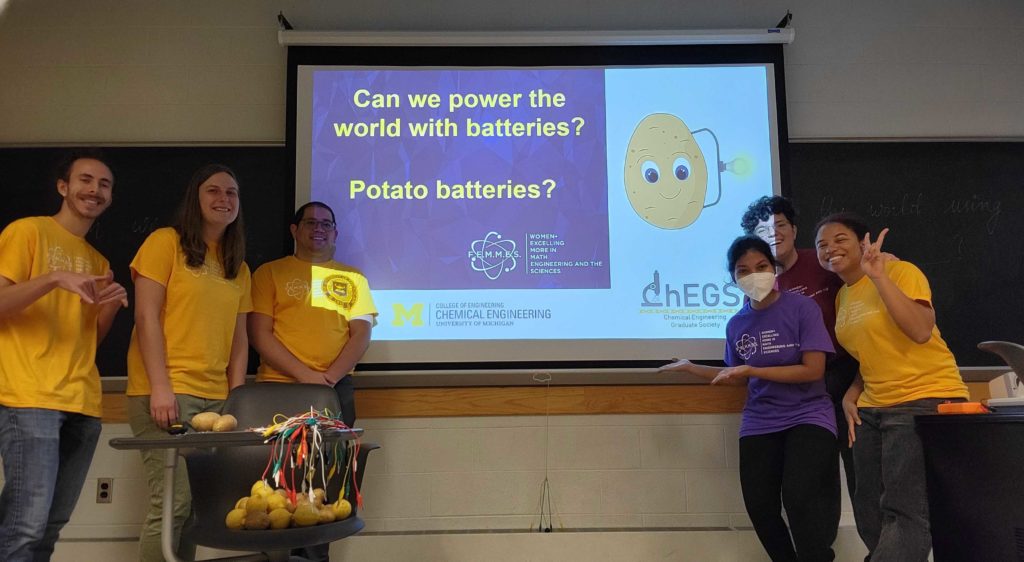
The power of collaboration: Encouraging students to explore STEM
A potato battery experiment encourages students to explore their potential in STEM and learn about engineering’s role in building a more sustainable future.

A potato battery experiment encourages students to explore their potential in STEM and learn about engineering’s role in building a more sustainable future.
A recent collaboration between the Chemical Engineering Graduate Society (ChEGS) and Women+ Excelling More in Math, Engineering, and Science (FEMMES) allowed fourth through sixth grade students from underrepresented areas in Ann Arbor, Ypsilanti and Detroit to participate in an activity to learn about renewable energy sources and using science to build a more sustainable future.
ChEGS has been a partner of FEMMES for over seven years, working to promote science literacy and exploration for fourth through sixth grade students. Every fall and winter, Michigan Chemical Engineering students volunteer to lead FEMMES Capstone activities.
“The greatest part of these outreach activities between ChEGS and FEMMES is the look on the young students’ faces when they hear the activities we have planned for them,” ChEGS Outreach Chair José Carlos Díaz said. “From cross-linked polymers and iron separation from dirt last year to cool potato batteries this year, we strive to foster curiosity and get these young minds interested in scientific exploration.”
Each FEMMES event features a series of experiential learning activities led by the University of Michigan faculty and student volunteers to encourage students to learn and explore their potential in science, technology, math and engineering (STEM).
This year, the ChEGS outreach team prepared a lesson for students centered around energy and batteries in an effort to increase awareness of renewable energy use and the role chemical engineers have in building a more sustainable future.

The experimental activity consisted of building a potato battery to demonstrate how science can be utilized to create compact long-duration batteries for things like smartphones, cars or houses.
“After students were introduced to renewable energy concepts we explained the intermittency of these resources – the sun is not always out, and the wind is not always blowing – and the need for energy storage tech or ‘batteries’ to store the surplus and use it when needed,” Díaz explained. “We spoke about different batteries, components of a battery, and asked students if they knew how to make a battery with food.”
The first part of the activity was to illuminate a small LED light with a potato battery. The battery was composed of a copper nail, a zinc nail, connected by alligator clips and a potato – these components connected in the right way can act as a battery due to the electron transfer between copper and zinc metals and the electrolyte offered by the potato.
The first LED light intentionally did not illuminate because one potato does not offer enough voltage. As part of the second task, students were required to collaborate with another student to illuminate the LED with two potatoes.
The third task challenged students to illuminate two LED lights. For this task, students needed to join forces with other teams to illuminate both LEDs – at this point each team needed five or six potatoes to illuminate both lights.
This portion of the task was designed to demonstrate the necessity of collaboration in STEM fields to accomplish a goal for the common good.
“Volunteering at the FEMMES Capstone event was a fun and meaningful opportunity to engage students in our community with hands-on science,” volunteer and Michigan Chemical Engineering Research Technician Adena Collens said. “My favorite moment of the day was the girls’ excitement at learning that we get to do science experiments as our jobs, all day every day. The ChEGS outreach team did an excellent job organizing the presentation and activity.”
Through engaging, hands-on activities presented in a fun, supportive environment, FEMMES programs encourage students to learn and explore their potential in STEM. Although this program is targeted toward girls, it is open to students of any gender identity to demonstrate how women and gender minorities can, and do, excel in scientific fields.
The ChEGS outreach team includes Oluwaseun Akanbi , José Carlos Díaz, Abha Kumari, Jessica Ma and Harsh Patel. Students interested in outreach opportunities within the department can contact these students for additional information.